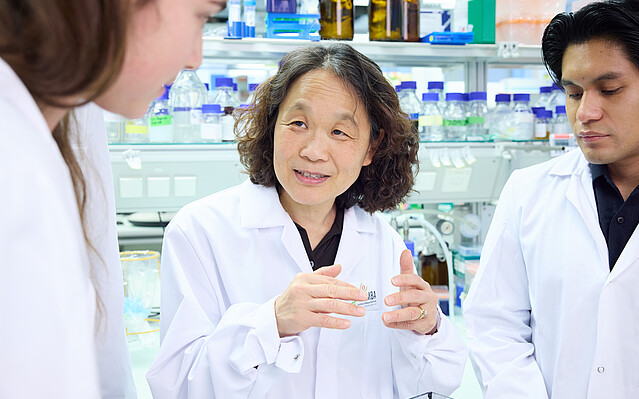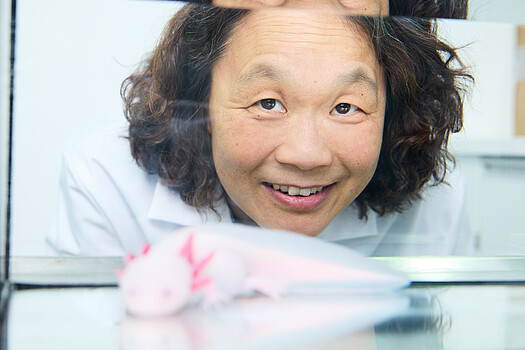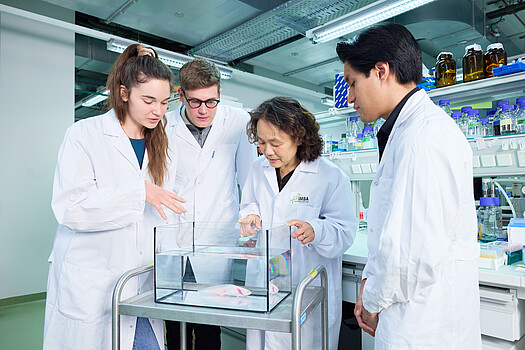Reason for optimism – Austria’s life sciences are world-class
October 10, 2025|RW
Rethink Europe. Recognize what’s already there. Celebrate it!
The Scientific Director of the Institute of Molecular Biotechnology (IMBA), Elly Tanaka, recently published an opinion piece in Der Standard. In it, she emphasizes the high level of scientific research in Europe and acknowledges Austria’s efforts to build state-of-the-art centers of academic excellence.
Read the slightly adapted full-length English version below, republished with the kind permission of IMBA.
In a recently published commentary in Der Standard, Helga Nowotny called for „rethinking Europe” – an appeal to bring top researchers from the United States to Europe. The piece received mixed reactions. Some questioned Europe’s competitiveness – a stance I consider too pessimistic. The research environment and achievements at Austrian institutions provide every reason for optimism.
My own career path may illustrate this point. In the 1990s, I moved from a leading U.S. university to London, and in 2016, I decided to make Austria my academic and professional home. As part of the international life sciences community, I have observed the development of Europe’s research landscape up close over the past three decades. From this perspective, I can say with confidence: Austria is stronger than many believe.
With its combination of intellectual infrastructure, professional institutions, and high quality of life, Austria – and particularly Vienna – offers compelling reasons for researchers from around the world to conduct their work here. Accordingly, we are receiving an increasing number of inquiries from outstanding scientific talents eager to join us
Excellence in Education and Training
Austrian students begin their scientific careers on a solid foundation. The education system here—despite some challenges—produces young people who are impressively well prepared for the demands of research. Their curiosity and commitment are in no way inferior to those of students at the best U.S. universities.
A strong institutional ecosystem:
Funding agencies such as the Austrian Science Fund (FWF) and the Vienna Science and Technology Fund (WWTF) operate at the highest professional level. Institutions like the Austrian Academy of Sciences (ÖAW) provide long‑term stability through reliable base funding—an essential prerequisite for ambitious, curiosity‑driven research.
Political and societal support
Research is not only an academic task but also a societal one. In international comparison, Austrian politicians and public institutions are strongly engaged in science policy—from basic research to application‑oriented projects. Even though there is a certain skepticism toward science, that should not obscure the fact that a large majority clearly supports scientific and intellectual work.
A critical mass of excellence
Clusters such as the Vienna BioCenter and the Institute of Science and Technology Austria (ISTA) are true powerhouses for talent and infrastructure. These environments create ideal conditions for interdisciplinary collaboration, career opportunities, and family‑friendly working conditions—all decisive factors for researchers at every stage of life. Such ecosystems not only enable top‑level scientific performance but also foster a vibrant research culture.
From basic research to application
From basic research to application: In these centers, the bridge between science and industry succeeds as well. Agencies such as the Austrian Research Promotion Agency (FFG) play an important role. Cooperation between the public and private sectors works: translating basic research into start‑ups here is not a theory—it is lived reality.
A city that connects life and science
Vienna is regularly counted among the most livable cities in the world for good reason. The city is cosmopolitan, culturally rich, yet affordable, family‑friendly, and full of life. Added to this are excellent international connections and a strong English‑language research culture at leading institutions—a clear magnet for international talent.
Of course, no system is perfect. Differences in institutional culture, administrative hurdles, or uneven funding landscapes persist. Experiences can vary by discipline. But the key point is this: you have to see the forest, not just the trees. Over the past 20 years, Austria has undergone a quiet revolution in research. Today the country plays in the top tier internationally—especially in the life sciences and quantum physics.
Three Nobel Prizes in recent years have had connections to Austria. In the life sciences, Austrian institutions – including my own institute, IMBA – significantly outperform international benchmarks. Our success rate for ERC grants stands at 60 percent, compared to an international average of just 13 percent. Per capita, Austria even surpasses Germany in ERC funding within the life sciences – a reflection not only of talent but also of excellent research conditions. These achievements are the result of a consistent science policy with increasing budgets in recent years. What matters now is to stay the course.
One of Austria’s particular strengths is its recognition of basic research as a value in itself – research pursued for the sake of knowledge. Many of today’s major medical breakthroughs have their roots in the curiosity of scientists studying bacteria, yeast, fruit flies, or snake venoms. Without this drive to understand nature, many modern medicines would not exist.
In the United States, there is a stronger culture of translating scientific discoveries into start-ups and new products. Young people found companies, and investors deliberately support risky, innovative ideas. Perhaps it would be exciting for Austria to foster a greater awareness that funding biotech start-ups can be an equally valuable and inspiring form of civic engagement – comparable to supporting art or sports.
As an American scientist who has chosen Austria not only as a place of work but also as a home, I can say with conviction: Austrians have no reason for an inferiority complex. On the contrary – they should be proud of the remarkable achievements made here. Austria is not merely a beneficiary of the global exchange of talent; it is itself a destination for bright minds from around the world. Through commitment, foresight, and passion, many have contributed to making Austria’s research a shining beacon in the global scientific landscape. This deserves recognition – and celebration.
The original version of this article can be found on the website of the Austrian Academy of Sciences.
Spotlight on Elly Tanaka
About Elly Tanaka
Elly Tanaka is the Scientific Director of IMBA - the Institute of Molecular Biotechnology of the Austrian Academy of Sciences. The American biochemist studied at Harvard University and the University of California, San Francisco, before moving first to London and later to a Max Planck Institute in Dresden. Since 2016, she has been conducting research at the Vienna BioCenter in the field of regenerative biology. Elly Tanaka remains closely connected with the academic community in the United States and was elected to the U.S. National Academy of Sciences in 2023.


